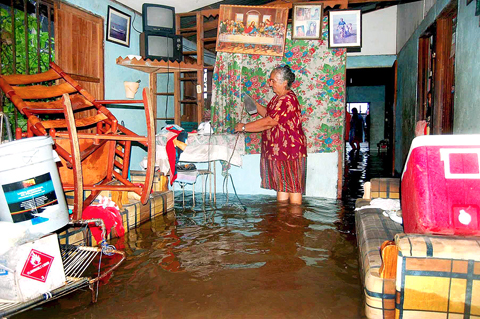Tropical Storm Alma made landfall on Thursday on Costa Rica’s Pacific Coast and blew through to Nicaragua, where 35,000 people were being evacuated.
The Miami-based US National Hurricane Centre (NHC) said that a tropical storm warning was in effect for the Pacific Coast of Central America, including Nicaragua, Honduras and El Salvador.
The eye of the storm was 85km west-northwest of Managua and about 280km east-south-east of San Salvador. According to the NHC report, it was moving northward at 15km an hour and was expected to turn northwest by yesterday.

PHOTO: EPA
Maximum sustained winds were near 100kph, with higher gusts.
The storm was expected to weaken overnight as it continued to move inland.
Nicaraguan civil defense boss Mario Perez-Cassar said that some 3,000 personnel had been deployed in low-lying areas, alongside military and police officers and Red Cross workers.
He said that 225 “critical points” were identified in the western provinces of Leon and Chinandega, with 23 municipalities at risk of suffering severe flooding, mudslides and flashfloods.
“We have a few hours to take away as many people as possible,” Perez-Cassar said.
He said that 25,000 people were to be evacuated first, with another 10,000 to follow.
Schools were closed on Thursday and yesterday in the provinces of Leon and Chinandega, in the southern provinces of Carazo and Rivas and in Managua.
Alma took authorities by surprise, having formed at an unusual location and time of year and surging in strength from a tropical depression to a powerful storm system within a few hours.
It dumped heavy rains across Central America.
Along Costa Rica’s Pacific coast, particularly in Parrita and Quepos, 250 people suffered damage to their property and had to move into emergency shelters.
The Costa Rican soccer championship final between archrivals Alajuela and Saprissa was postponed on Thursday.

FORUM: The Solomon Islands’ move to bar Taiwan, the US and others from the Pacific Islands Forum has sparked criticism that Beijing’s influence was behind the decision Tuvaluan Prime Minister Feletei Teo said his country might pull out of the region’s top political meeting next month, after host nation Solomon Islands moved to block all external partners — including China, the US and Taiwan — from attending. The Pacific Islands Forum (PIF) leaders’ meeting is to be held in Honiara in September. On Thursday last week, Solomon Islands Prime Minister Jeremiah Manele told parliament that no dialogue partners would be invited to the annual gathering. Countries outside the Pacific, known as “dialogue partners,” have attended the forum since 1989, to work with Pacific leaders and contribute to discussions around

END OF AN ERA: The vote brings the curtain down on 20 years of socialist rule, which began in 2005 when Evo Morales, an indigenous coca farmer, was elected president A center-right senator and a right-wing former president are to advance to a run-off for Bolivia’s presidency after the first round of elections on Sunday, marking the end of two decades of leftist rule, preliminary official results showed. Bolivian Senator Rodrigo Paz was the surprise front-runner, with 32.15 percent of the vote cast in an election dominated by a deep economic crisis, results published by the electoral commission showed. He was followed by former Bolivian president Jorge “Tuto” Quiroga in second with 26.87 percent, according to results based on 92 percent of votes cast. Millionaire businessman Samuel Doria Medina, who had been tipped

Outside Havana, a combine belonging to a private Vietnamese company is harvesting rice, directly farming Cuban land — in a first — to help address acute food shortages in the country. The Cuban government has granted Agri VAM, a subsidiary of Vietnam’s Fujinuco Group, 1,000 hectares of arable land in Los Palacios, 118km west of the capital. Vietnam has advised Cuba on rice cultivation in the past, but this is the first time a private firm has done the farming itself. The government approved the move after a 52 percent plunge in overall agricultural production between 2018 and 2023, according to data

ELECTION DISTRACTION? When attention shifted away from the fight against the militants to politics, losses and setbacks in the battlefield increased, an analyst said Recent clashes in Somalia’s semi-autonomous Jubaland region are alarming experts, exposing cracks in the country’s federal system and creating an opening for militant group al-Shabaab to gain ground. Following years of conflict, Somalia is a loose federation of five semi-autonomous member states — Puntland, Jubaland, Galmudug, Hirshabelle and South West — that maintain often fractious relations with the central government in the capital, Mogadishu. However, ahead of elections next year, Somalia has sought to assert control over its member states, which security analysts said has created gaps for al-Shabaab infiltration. Last week, two Somalian soldiers were killed in clashes between pro-government forces and